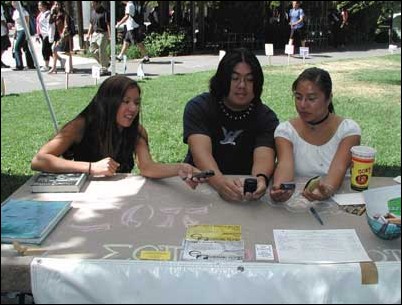Going Wireless

Image: Going Wireless:Photos by Kellie Yoakum-Gurley:
September 18, 2002
You see them all around campus–students with one arm crooked up to their head. They?re spouting a stunted monologue into an electronic device that bounces said monologue into the stratosphere and back down into someone else’s device to magically become a two-way conversation.
We’re talking cellular phones.
Love them or loath them, mobile phones are ubiquitous among students. Schedules crammed with work, class and commuting have made student cell phone use an essential part of collegiate life.
“I think if I didn’t have a cell phone, I would probably be on the pay phone a couple times a day,” said junior Summer Rivers.
Rivers says she uses her phone around five to 10 times a day to call friends, roommates and co-workers who she wouldn’t be able to call otherwise, since she gets home after 10 p.m. She also finds cell phones helpful in contacting students who, like her, spend little time at home. “I don’t know if I could live without it,” she says.
But maybe the omnipresence of cellular culture is more of a nuisance than a necessity.
“They ring all the time,” said junior Joe Wilson, who doesn’t own a cell phone. “You’re in a confined area and they start talking loudly as if no one was there, and now you know what they’re going to have for dinner,” he adds.
Perhaps the most annoying cell phone of all is the one that goes off in the middle of your 7 a.m. Trigonometry final. Class interruptions have become so prevalent that instructors have added clauses to their syllabi kindly asking students to shut them off.
“It’s a growing problem,” says Richard Shek, a humanities professor. Shek’s syllabus reads, “There shall be no ringing cell phones or pagers in the classroom,” like some kind of commandment. Although he hasn’t had to do it yet, he threatens that if a student’s phone rings, he’ll take the call.
“I am going to embarrass you by putting the spotlight on you,” he said. “In class there should be an activity going on,” he continues with all seriousness. “Cell phones have no place in that kind of setting.” Student Kelly Ryan thinks the same.
“Instructors shouldn’t have to put anti-cell phone language in their syllabus,” she said. Ryan believes “general courtesy” should lead students to turn their phones to silent or vibrate. “I guarantee any information you have about the latest party can wait,” she says. But in two of her three classes that day, cell phones had gone off.
Disrupting class isn’t the only way cell phones grab attention. Flashy faceplates and catchy ring tones are making communication a display of personal style. “Accessories are huge, just in the last two years they’ve gotten big,” says Roland Mar, owner of The Box Center in the University Union which sells faceplates, headsets and chargers.
With faceplates, students can show their love of dolphins, Hello Kitty, or even chocolate with scented faceplates.
Phones can also proclaim to the world what their current favorite pop song is. Websites like www.yourmobile.com have downloadable tunes like Missy Elliot’s “One Minute Man,” Weezer’s “Buddy Holly” and The Beatles’ “Hey Jude” that cost $2 each. Or maybe Barry White would be more apropos for some students who rely on cell phones to help out in the love department.
Minako Nakajima, a graduate student, has a long-distance boyfriend in Minnesota and used to pay $200 phone bills using her home telephone. Now using her cell phone with long-distance minutes, her monthly cost is only $60. “Everybody thinks it’s expensive, but it’s cheap for me,” Nakajima said.
With so many plans out there, it seems spokespersons like the Verizon “Can you hear me now?” guy, the Sprint PCS trench-coat man, and Catherine Zeta Jones are all duking it out for our cell phone dollars.
“If nothing else, the thing is expensive,” says Ryan, who utilizes call timers to stay within her plan’s limits. She just got her Samsung R225 phone for free last Thursday when she signed up with T-Mobile.
“It’s a great value for students, for anyone really,” said Dave Murray, a T-Mobile representative who signed up students in a booth outside the University Union that day. But there are still those bucking the trend, opting to go wireless-less and turning a smug nose at anyone with an antenna at their ear.
“They’re just bored. They share their boredom instead of doing something or reading a book or getting stuff done,” says Wilson. You can bet he?s in denial and thinking how things might be easier if he had a cell phone in his hands right now.




























































































































